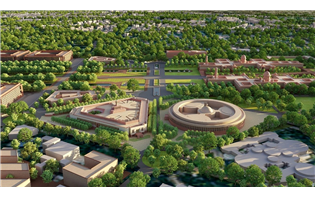India, the world’s largest democracy, will usher in the diamond jubilee celebrations of Independence from British colonial rule with a new Sansad Bhawan or Parliament House in 2022.
Prime Minister Narendra Modi laid the foundation stone of the new parliament building on Thursday.
The new building is an intrinsic part of the vision of Aatmanirbhar Bharat and will be a landmark opportunity to build a peoples’ parliament for the first time after independence, one which will match the needs and aspirations of what the prime minister has often referred to as the ‘New India’.
Speaking on the occasion, which was marked by a traditional Bhoomi Pujan (groundbreaking ceremony) and an interfaith prayer meeting, the prime minister termed it a milestone in India’s democratic history. “What can be more beautiful than the fact that the new parliament building will serve as an inspiration in the 75th year of our Independence. Today is a very auspicious day for 1.3 billion Indians as we witness an important moment in our history,” he said.
He added that the start of the construction of the new parliament house was among the most important stages in the evolution of the country’s democratic traditions. He called upon citizens to build the new parliament building together.
The new parliament building will be modern, state-of-the-art and energy-efficient, with highly non- obtrusive security facilities to be built as a triangular-shaped building, adjacent to the existing Sansad Bhawan. The Lok Sabha will be three times its existing size and, similarly, Rajya Sabha will also be substantially bigger. The interiors of the new building will showcase a rich blend of Indian culture and the diversity of the country’s regional arts, crafts, textiles and architecture. The design plan includes space for a magnificent Central Constitutional Gallery that will be accessible to general visitors.
Being built on a Rs 9.71 billion budget, the construction of a new parliament building will utilise resource-efficient green technology, promote environmentally friendly practices, generate employment opportunities and contribute towards economic revitalisation. It will have high-quality acoustics and audio-visual facilities, improved and comfortable seating arrangements, effective and inclusive emergency evacuation provisions. The building will comply with the highest structural safety standards, including adherence to Seismic Zone-5 requirements and is designed for ease of maintenance and operations.
New Building to Enshrine Aatmanirbhar Bharat
Recalling the moment when he had entered Sansad Bhawan for the first time in 2014 as a Member of Parliament from Varanasi, he said that that he had bowed his head to salute this temple of democracy before stepping inside. He remarked that many new things were being done in the new parliament house that will increase the efficiency of the MPs and modernise their work culture.
“If the old parliament house gave direction to post-independence India, the new building would become a witness to the making of an Aatmanirbhar Bharat. If work was done to fulfill the needs of the country in the old parliament house, then the aspirations of 21st century India will be fulfilled in the new building,” he emphasised.
The prime minister remarked that democracy elsewhere was about election procedures, governance and administration but democracy in India was about life values as it was part of its ethos. He added India’s democracy was a system developed through centuries of experience. He said it is India’s democratic strength that was giving new energy to the development of the country and giving new faith to its countrymen. He said democracy in India was constantly being renewed every year and it is seen that voter turnout is increasing with every election.
The prime minister remarked that democracy in India had always been a means of resolving differences along with governance. Differing views and perspectives empowered a vibrant democracy. He said the Indian democracy had moved forward with the goal that there is always room for differences so long as it was not entirely disconnected from the process. He stressed that policies and politics may vary but we are for the service of the public and there should be no differences in this ultimate goal. He added whether debates occur within the parliament or outside, the determination towards national service and dedication towards national interest should be reflected in them constantly.
The prime minister urged the people to remember that it is the responsibility of the people to awaken the optimism towards democracy that is the basis of the existence of the parliament house. He reminded that every member who entered Parliament was accountable towards the public as well as the Constitution. He said there were no rituals as such to consecrate this temple of democracy. It is the representatives of the people who come to this temple that will consecrate it.
The Prime Minister urged the people to take the pledge to keep “India First” and pray for the country’s progress. He urged everyone to take the pledge that there would be no greater interest for them than national interest. Nothing will be more important to them than the unity and integrity of the country. Dignity and fulfilment of the constitution of the country will be the biggest goal of their life.



Leave a Reply
You must be logged in to post a comment.